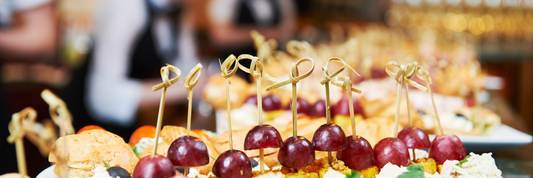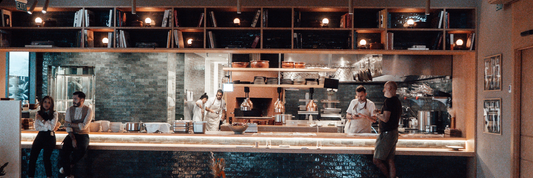Catering services play an essential role in bringing exceptional dining experiences to events of all sizes, from intimate gatherings to large corporate functions. By offering customized menus, professional food preparation, and seamless service, catering businesses help hosts create memorable occasions without the stress of managing the details themselves. As consumer expectations rise for quality, presentation, and diverse culinary options, catering services have evolved to meet a wide range of needs from traditional plated dinners to innovative themed buffets and eco-friendly solutions.
-
Cloud Kitchen Marketing for Caterers: How to Effectively Market Your Services
-
Catering Equipment: Essential Tools for Coffee Shops & Restaurants
-
What Caterers Need to Know About Charger Plates for the Best Service
What Are Catering Services?

Catering services involve preparing and delivering food and related services for events. These services can range from small gatherings to large-scale events, with varying levels of service to accommodate different needs and budgets.
Definition of Catering Services
At its core, catering services provide food and drink for specific occasions, ensuring that guests enjoy a quality dining experience without the hassle of preparation and service on-site by the event host. This is particularly useful for those who wish to focus on other aspects of their events.
Types of Catering
Catering encompasses a variety of offerings tailored to particular types of events:
- Event Catering: This includes catering for parties, reunions, and any social gatherings that require food service.
- Corporate Catering: Aimed at professional gatherings such as meetings, conferences, or corporate celebrations, this often includes breakfast, lunch, or dinner service.
- Wedding Catering: Specialized services that focus on providing meals for wedding receptions, often with multiple courses and specific menu choices.
- Mobile Catering: This refers to food trucks or mobile units that serve food at various locations, offering a casual dining experience at events and festivals.
How Catering Services Differ from Restaurant Services
Catering services stand apart from traditional restaurant services primarily in their focus on events rather than walk-in customers. While restaurants provide set menus and services to patrons dining at their establishment, catering services often offer customized menus and on-site service tailored specifically to the requirements of an event.
Types of Catering Services Explained

Different catering services cater to varying needs, offering flexibility in both food presentation and service style.
Full-Service Catering
Full-service catering includes not only food preparation but also setup, service during the event, and cleanup afterward. This approach allows hosts to enjoy their event without worrying about logistics.
Buffet Catering
In buffet catering, guests serve themselves from a variety of dishes presented on a long table. This is a popular option because it allows for a diverse dining experience, accommodating different preferences and dietary requirements.
Drop-off Catering
This service involves delivering pre-prepared meals to an event location. It's ideal for smaller gatherings or events with less formal service expectations, where hosts need quality food without full service.
Food Truck and Mobile Catering
Food trucks and mobile catering provide a fun and casual dining option, especially for outdoor events. With various cuisines available, they are becoming a popular choice for festivals and casual weddings.
Private Chef Services
For those seeking an exclusive dining experience, hiring a private chef offers personalized meal preparation tailored to specific tastes. This service is often used for intimate gatherings or special occasions.
How Catering Services Work: Step-by-Step

Understanding how catering services function can simplify the planning process for any event organizer.
Planning and Consultation
The catering journey often begins with a consultation, where hosts discuss their needs, preferences, and budget with the catering team. This initial meeting establishes the foundation for a successful collaboration.
Menu Customization
After the planning stage, catering teams work on customizing a menu that fits the occasion. This stage often considers dietary restrictions, themes, and seasonal ingredients to create a unique dining experience.
Logistics: Setup, Service, and Cleanup
Logistics is a vital aspect of catering services. It includes arranging the setup of food stations, coordinating staff for service, and handling the post-event cleanup. A well-orchestrated plan ensures smooth service flow and guest satisfaction.
Coordination with Event Planners and Venues
Caterers often collaborate with event planners and venues to ensure every detail is aligned with the event's overall vision. This partnership can prevent potential hiccups and streamline the process for an enjoyable experience for both hosts and guests.
Key Benefits of Hiring Professional Catering Services

Stress-free Event Planning
When organizing an event, whether it’s a wedding, corporate meeting, or casual gathering, the array of details can quickly become overwhelming. Hiring professional catering services alleviates much of this burden. Caterers help manage logistics, ensuring that aspects like food preparation, service staff, and clean-up are handled efficiently. This allows you to focus on other critical elements of your event, such as guest interaction and overall experience.
Imagine planning a wedding reception. Instead of spending days worrying about how many appetizers to prepare or what the presentation will look like, you can trust the expertise of a catering service to handle these details. This not only saves time but also reduces stress levels, allowing you to enjoy the planning process.
High-quality Food and Presentation
One of the significant advantages of hiring caterers is the top-notch quality of food they provide. Professional caterers are trained chefs who understand the nuances of flavor, presentation, and culinary techniques. They source high-quality ingredients and often have access to seasonal and locally grown options that can elevate any menu.
The presentation of the food is equally important. A beautifully arranged platter or elegantly served dish can significantly enhance the appeal of your event. For instance, consider a corporate gala where hors d'oeuvres are not only delicious but also artistically presented this sets the tone for the evening and leaves a lasting impression on your guests.
Customizable Menus for Dietary Needs
Modern events require an awareness of dietary restrictions and preferences. Professional catering services offer customizable menus that cater to various dietary needs, including vegetarian, vegan, gluten-free, and allergen-friendly options. This flexibility ensures that all guests can enjoy the meal without compromise.
For example, during a recent family reunion, the catering service provided a diverse menu, including a range of options for those with gluten sensitivities alongside delicious traditional fare. This attention to dietary requirements not only reflects thoughtfulness but also enhances overall guest satisfaction.
Enhances Guest Experience
Food often plays a pivotal role in creating memorable experiences. Hiring a catering service ensures that the meal itself becomes a highlight of your event. Flexible serving styles like buffet, family-style, or plated meals allow for a personalized touch that can enhance interaction among guests.
Furthermore, experienced catering teams know how to engage with guests and create an inviting atmosphere. For instance, a cocktail reception with interactive food stations encourages mingling and makes the dining experience more enjoyable. This elevated guest experience can leave a lasting impression and make your event unforgettable.
How to Choose the Right Catering Service

Questions to Ask a Catering Company
When searching for a catering service, it’s crucial to ask the right questions to ensure they meet your needs. Consider inquiring about:
- Their experience with similar events
- Specific services they offer (staff, equipment, etc.)
- How they handle dietary restrictions
- Their payment terms and cancellation policies
These questions will help you gauge the suitability of the catering provider and align their offerings with your vision for the event.
Importance of Tasting Sessions
A tasting session is a vital step in selecting the right caterer. It provides an opportunity to sample the food and assess whether it meets your standards. During the tasting, pay attention to the flavors, presentation, and overall enjoyment of each dish.
For instance, after confirming a caterer for an anniversary party, I attended a tasting session where the team showcased their signature dishes. The experience was enlightening, and it helped me confidently finalize menu choices that suited both my preferences and my guests’ tastes.
Evaluating Catering Packages and Contracts
Catering services often offer different packages, each catering to various needs and budgets. Review these packages carefully to ensure they include everything you require, from food and beverage options to staffing and setup.
Additionally, always read through the contract thoroughly to avoid any hidden fees or misunderstandings. It’s crucial to understand what is included in the price and any potential extra costs for additional services.
Checking References and Reviews
Before making a final decision, take the time to check references and read reviews of potential catering services. Reach out to past clients to gather insights about the quality of food, reliability, and overall experience. Online reviews can also provide valuable information on what to expect from the catering company.
In my planning process for a charity function, I found that checking references led me to a caterer who had consistently excellent feedback regarding their service and food. The positive testimonials played a significant role in my decision-making, ultimately leading to a successful event.
Trends in the Catering Industry
Sustainable and Eco-Friendly Catering
In recent years, there has been a notable shift towards sustainable and eco-friendly catering options. This trend focuses on minimizing the environmental impact of food services. Caterers are increasingly sourcing local and organic ingredients, reducing food waste, and using biodegradable or reusable materials for serving. This not only appeals to environmentally conscious consumers but also enhances the overall dining experience by offering fresher, seasonal dishes.
Plant-Based and Health-Focused Menus
With a growing awareness of health and wellness, many caterers are embracing plant-based and health-focused menus. Vegetarian and vegan options are no longer an afterthought; they are now central to many catering offerings. These menus highlight the use of whole grains, seasonal vegetables, and nutritious proteins, catering to diverse dietary needs while promoting healthier eating habits.
Technology in Catering (Online Ordering, Digital Planning)
The integration of technology in catering has transformed the way services are planned and delivered. Online ordering and digital planning tools have made it easier for clients to customize their menus and place orders. Many catering companies are now offering user-friendly platforms where clients can view menus, make selections, and even track delivery in real-time. This technological advancement not only streamlines operations but also enhances customer satisfaction.
Rise of Virtual Catering and Remote Event Services
The rise of virtual events has necessitated a shift in catering services. Virtual catering provides meal kits or gourmet snacks delivered to participants’ homes, ensuring a cohesive dining experience even from afar. This service allows businesses and individuals to engage in remote gatherings while enjoying high-quality food tailored to the occasion, whether it’s a corporate meeting or a family reunion.
Costs of Catering Services: What to Expect

Factors that Influence Catering Prices
When considering catering services, several factors influence the overall cost. These include the type of cuisine, the scale of the event, menu complexity, and additional services such as staffing, rental equipment, and transportation. Seasonal variations in ingredient pricing can also affect the final bill. Understanding these factors can help clients make informed decisions when selecting their caterers.
Average Costs for Different Types of Catering
Catering costs can vary widely based on the service type. Here’s a general breakdown of what to expect:
- Buffet-style service: Typically ranges from $15 to $50 per person.
- Plated meals: Usually priced between $25 and $75 per person, depending on the complexity.
- Food trucks or casual catering: Generally lower, ranging from $10 to $30 per person.
- Corporate catering: Often structured packages, averaging $20 to $50 per person.
Tips to Stay Within Your Catering Budget
To remain within budget, it’s essential to:
- Clearly define your budget before starting searches for a caterer.
- Consider less peak times for events, as this can lower costs.
- Limit the menu to a few signature items rather than an extensive selection.
- Ask about package deals that include drinks, desserts, or rentals.
- Always read the fine print to avoid unexpected charges.
Conclusion
Catering services play a crucial role in the success of any event, enhancing the overall experience through delicious food and thoughtful presentation. When selecting a caterer, consider your audience's preferences, your budget, and the types of services each provider offers. With careful planning and a focus on quality, your catering choice can elevate your event from ordinary to extraordinary.









